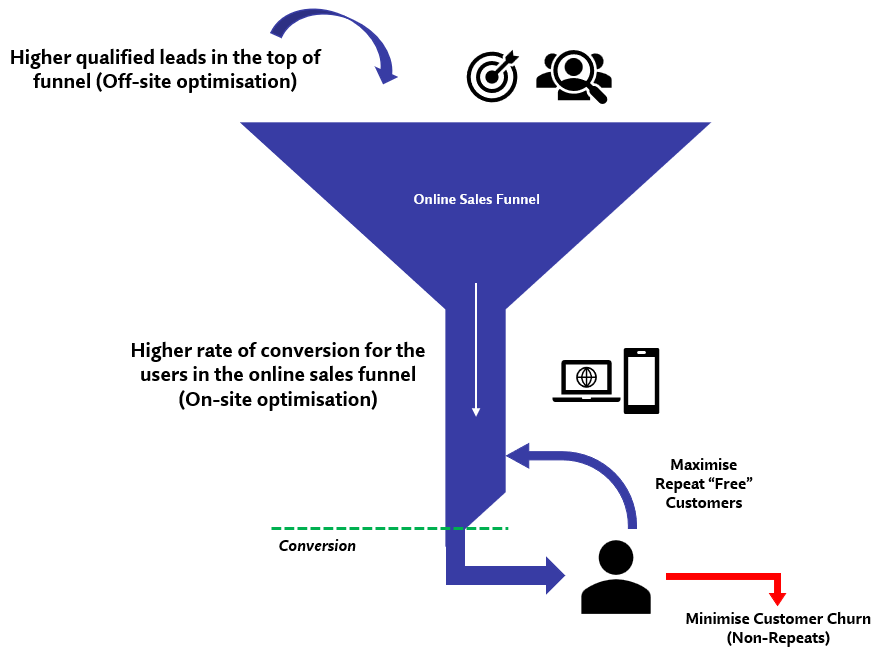Digital Analytics for Small Businesses & Scale-Ups
Take on the established digital players, with data & analytics giving you the edge
Problems Small Business Owners Face
No matter what industry you operate in, any online business has a fierce levels of competition, with high barriers of entry for new players in any market. In particular, any business that relies on a heavy digital presence to sell products online or generate leads will find the first year challenging.
Why do start-ups & Small Businesses find it difficult to break through online?
- Technical knowledge & access to digital skills.
- High volume of competition, Cost & Lack of domain authority in search engines.
- Difficulty of capturing and leveraging data.
Technical Knowledge & Access to Digital Skills

Launching or scaling an online business is fraught with unknowns. For example choosing a web platform, designing a website, hosting, cookie policy, data and analytics setup, measuring conversions, pay-per-click advertising, SEO, ecommerce tracking, backend integrations, specialist code…
The list can seem very long and time consuming to think about, let alone execute.
Once everything is set up, you still need to actually do business on your digital platform. To do this effectively needs everything to be set up compliantly and accurately. And with a physical store, you wouldn’t open to customers if the till wasn’t working or you couldn’t record your sales. You need to devise a digital marketing strategy that identifies your target audiences, optimising the channel mix based on spend, volume and quality of leads.
Taking that first step into digital marketing platforms can be daunting. Many new businesses can and do incur waste if it is not done effectively.
The world of digital marketing is very complex, especially the world of data & analytics. Tools have evolved to become complicated data platforms, and stitching these together with advertising activity to measure performance needs specialists to set up. For start-ups and small businesses, small budgets mean there isn’t much left to hire professional analysts and marketers, meaning access to the right skills is limited.
This is where Digital Analytics freelancers are advantageous to give on demand skills for the fraction of the price of full time employees. This enables new businesses to be agile and scale teams effectively based on demand.
High Volume of Competition

Online marketing is not dissimilar to a busy fruit market. If you rock up next to the vendors who have been trading for decades, you’d best bring your ‘A’ game.
In digital markets, established businesses are able to throw lots of budget at both recruiting industry leading talent, and into digital advertising bidding itself. This drives up the costs for everyone in the market though inflation of prices.
Many smaller businesses must be prepared to match, and initially out-spend big market players on bidding. The key tactic is to generate website volume through any digital advertising in absence of high domain authority on search engines.
The second issue is brand recognition. Unfortunately, in the online marketplace, so much authority is placed on the top three results on the Google results page. Brands with high recognition naturally have a high click through rate and high authority. Usually, they have optimised how search engines view their website to be shown in those 1st positions.
How to solve it?

Use Digital Analytics for Small Business to:
- Maximise the efficiency of online advertising:
- To get the best cost-per-click
- Convert website traffic better:
- It makes sense to focus every effort on converting those people who show interest in your brand or product area.
- Keep customers coming back:
- If you generate repat customers, your marketing costs will be significantly reduced.
Without advanced Data Analytics, each step of this three step process would not be possible to do effectively.
How is this done?
By collecting data about your customer characteristics, you can automatically target customers who are exactly your target audience. Don’t waste spend on people who are not interested in your brand, reaching the right customer, with the right product at the right time.
Then, you can use data & analytics to identify high friction points in your user journey, joining together the offline and online worlds. By understanding your user’s challenges, you can optimise the journey, convert more and need to spend less to get the same return on investment.
Starting and scaling a business can be very challenging, It need not be with the help of Digital Analytics for small businesses.
Get in touch with me today for a free consultation. Discover how your business can scale-up with the power of Digital Analytics for small business

Need a website building from scratch?
Apex Digital’s partners, BAW Creative, specialise in delivering industry-leading website builds.
Read more on Digital Analytics…
-
10 things to analyse that will improve website performance
What are the most effective data points to track that tell you how well your website is functioning? The purpose of most websites is either to drive ecommerce sales, drive leads or drive engagement with content. Some of these are applicable to all of these, while some are quite specific. The key metric we should…
-
Privacy Sandbox: What is happening to 3rd party cookies?
You may have seen some noise online about the phasing out of third-party cookies and the introduction of Google’s Privacy Sandbox. This post is to explain what this means in varying aspects of digital marketing. There’s lots of emotive & negative language to describe this change. Some may call it a “cookie-pocalypse”, be very wary…
-
Alternatives to GA4 (Part 1): Where is Digital Analytics Heading?
What other Digital Analytics tools are available? There are many Digital Analytics Tools that are alternatives to Google Analytics 4 (GA4) on the market today. These existed before GA4, but have come to the forefront because of the consensus that standard GA4 can be limited for many basic use cases. In this article I’m going…
Connect with me on LinkedIn
